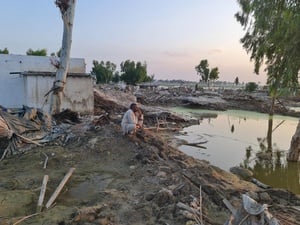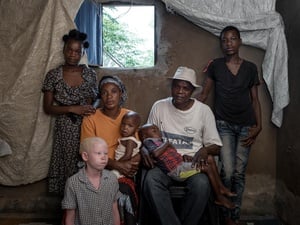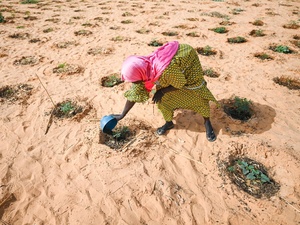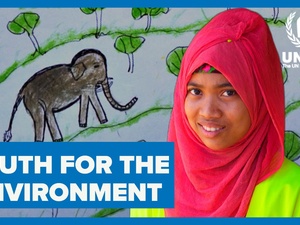Climate change is an emergency for everyone, everywhere
Climate change is an emergency for everyone, everywhere

A Fulani herdsman leads his cattle from Lake Mahmouda's receding waters in Mauritania.
In the run-up to COP26, much of the conversation has dealt with predictions about the future and forthcoming pledges for more decisive action: carbon neutral by 2030, net zero by 2050.
But for millions of people around the world, climate change is already a daily reality.
Ninety percent of refugees under UNHCR’s mandate, and 70 percent of people displaced within their home countries by conflict and violence, come from countries on the front lines of the climate emergency.
They are vulnerable not only to extreme weather like floods or cyclones, but also to seeing their livelihoods dry up due to drought and desertification.
From Burkina Faso to Bangladesh, and from Afghanistan to Mozambique, climate change is increasing poverty, instability and human movement; it is fuelling tensions and competition over dwindling resources.
Outbreaks of violence and extreme weather push people who have already fled once to flee again. But even if peace is restored, displaced people cannot go back if their home areas have been made uninhabitable by drought, floods or rising sea levels.
What we are seeing now is a devastating convergence of conflict and climate change that is both driving displacement and making life even more precarious for those already forced to flee.
Some of the most climate-vulnerable countries are mired in conflicts that have lasted for decades and devastated generations.
In Afghanistan – one of the most fragile countries in the world suffering from four decades of conflict – the compounding impacts of climate change are having profound consequences for those least able to cope. UNHCR has worked in Afghanistan for more than 40 years. I personally served in the country for several years. The protracted conflict has had an irrevocable effect – forcing people to leave the country but also causing internal displacement.
A prolonged drought meant many Afghans were struggling to feed their families even before recent developments left the economy on the verge of collapse. Any further deterioration of the humanitarian situation will almost inevitably lead to yet more displacement in a country where 665,000 people have already been forced from their homes this year.
To many readers in wealthier countries, this may seem like a distant problem in distant lands. But the Intergovernmental Panel on Climate Change (IPCC) warned in August that irreversible changes in the Earth’s climate are being observed in every region. This year alone, catastrophic flooding killed more than 200 people in Europe, heatwaves caused deaths in Canada, and wildfires have raged in Siberia, across the Mediterranean and along the western coasts of the United States and Canada.
The world is finally waking up to the fact that climate change is an emergency for everyone, everywhere. The stark reality, though, is those who did the least to contribute to it are already suffering the most.
If some of the most prosperous and advanced nations have struggled to help their populations recover and adapt to an increasingly unpredictable climate, what does this mean for a country like Mozambique? One of the least developed countries in the world, it is grappling with violent attacks that have displaced more than 730,000 people while struggling to recover from a series of cyclones, including Cyclone Idai in March 2019 – one of the worst storms ever recorded in the southern hemisphere.
The longer we delay global action and support to countries like Mozambique, so they can mitigate the effects of climate change, the worse the consequences will be.
Estimates predict that without ambitious climate action, the number of people in need of humanitarian assistance due to disasters could increase to 200 million annually by 2050 – twice the current number.
What can we do and what are we doing?
UNHCR has operations in more than 130 countries and 70 years of experience protecting the displaced. We are using this expertise and knowledge to help countries with limited means and resources to better anticipate and respond to displacement caused by disasters. In places where people are already displaced, we are helping them prepare for and adapt to climate change.
In Bangladesh, for example, UNHCR and partners have been helping Rohingya refugees reduce the risk of flooding and landslides during monsoon season by planting fast-growing trees to stabilise hillsides, providing alternative energy sources to firewood for cooking, and training refugee volunteers as first responders.
We are ready to step up our response, but we need help to do so. Some of the solutions will be financial; some of them technical. But most will need to come from communities on the front lines of the climate emergency. Their voices must be heard at COP and beyond. They have generational knowledge of the land, and therefore, ancestral solutions which can be applied.
The human costs of climate change are here and now. If our collective efforts to drastically reduce emissions and limit global warming fall short, the landscape in which UNHCR operates today risks becoming a universal reality.
Younger generations are rightfully fighting for their future human rights. We are now beyond pledges – we need action and accountability.
This piece was originally published by Al Jazeera on 5 November, 2021.









